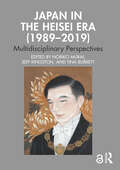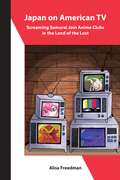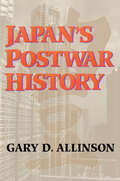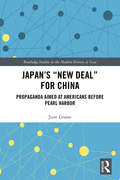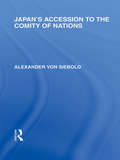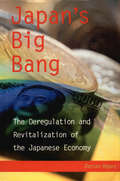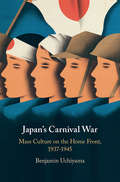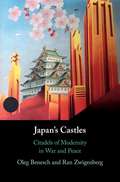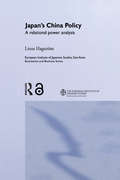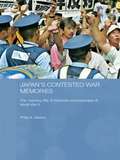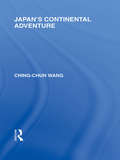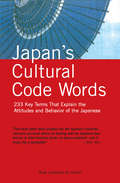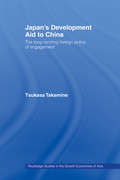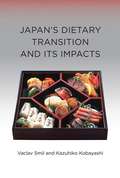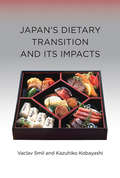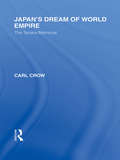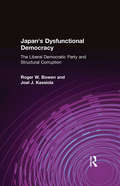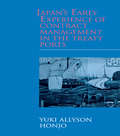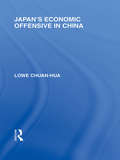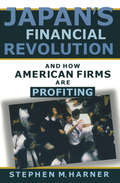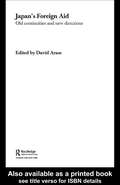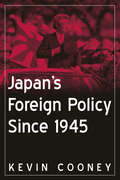- Table View
- List View
Japan in the Heisei Era (1989–2019): Multidisciplinary Perspectives
by Jeff Kingston Tina Burrett Noriko MuraiJapan in the Heisei Era (1989–2019) provides a retrospective and multidisciplinary account of a society in flux. Featuring analyses from leading scholars around the globe, this textbook examines the evolving contexts of Japan throughout the Heisei era and how longstanding verities and values have been called into question. Asking what this holds for Japan’s future relations with the world and within its own communities, chapters delve beneath the layers of a complex and increasingly diverse society, exploring topics including simmering ethnonationalism, economic torpor, political stagnation, and cultural dynamics. Features of this textbook include:• Analysis of key social issues ranging from immigration, civil society, press freedom, politics, labour and the economy, to diversity, the marginalisation of women, Shinto, and Aum Shinrikyo• Evaluation of the legacy of Emperor Akihito on war memory, the imperial institution, art, regional relations, and constitutional revision• Multidisciplinary insights from both the social sciences and humanities• Rich illustrations for visual analysis of developments in contemporary Japanese literature, film, art, and pop culture Providing students with dynamic analyses of how contemporary Japanese society continues to transform, this textbook is essential reading for students of Japanese Studies, including Japanese culture, society, history, and politics.
Japan in the Heisei Era (1989–2019): Multidisciplinary Perspectives
by Jeff Kingston Tina Burrett Noriko MuraiJapan in the Heisei Era (1989–2019)provides a retrospective and multidisciplinary account of a society in flux. Featuring analyses from leading scholars around the globe, this textbook examines the evolving contexts of Japan throughout the Heisei era and how longstanding verities and values have been called into question. Asking what this holds for Japan’s future relations with the world and within its own communities, chapters delve beneath the layers of a complex and increasingly diverse society, exploring topics including simmering ethnonationalism, economic torpor, political stagnation, and cultural dynamics.Features of this textbook include: Analysis of key social issues ranging from immigration, civil society, press freedom, politics, labour and the economy, to diversity, the marginalisation of women, Shinto, and Aum Shinrikyo Evaluation of the legacy of Emperor Akihito on war memory, the imperial institution, art, regional relations, and constitutional revision Multidisciplinary insights from both the social sciences and humanities Rich illustrations for visual analysis of developments in contemporary Japanese literature, film, art, and pop culture Providing students with dynamic analyses of how contemporary Japanese society continues to transform, this textbook is essential reading for students of Japanese Studies, including Japanese culture, society, history, and politics.The Introduction and Chapter 19 of this book are freely available as a downloadable Open Access PDF at http://www.taylorfrancis.com under a Creative Commons Attribution-Non Commercial-No Derivatives (CC-BY-NC-ND) 4.0 license.
Japan in the Posthegemonic World
by Tsuneo Akaha Frank LangdonThe diversity of views on the causes and consequences of U.S. hegemonic decline notwithstanding, there is an almost unanimous worldwide opinion that the management of global and regional problems in the post-Cold War era requires, at a minimum, effective and timely policy coordination and efficacious burden- and power-sharing among the United States, Japan, and the European Community. The editors of this volume believe that collective management of post-Cold War problems is both desirable and possible, but that it would require hitherto unprecedented levels of cooperation among the three power centers. Particularly crucial, we believe, will be Japan's ability and willingness to define clearly its role in the emerging new world order and to translate that definition into effective policy. Equally important will be the expectations of others regarding Japan's role and behavior in the posthegemonic world and how any discrepancies between the Japanese and non-Japanese views can be eliminated--or at least reduced-- through political dialogue and policy coordination.
Japan on American TV: Screaming Samurai Join Anime Clubs in the Land of the Lost (Asia Shorts)
by Alisa FreedmanJapan on American TV explores political, economic, and cultural issues underlying depictions of Japan on U.S. television comedies and the programs they inspired. Since the 1950s, U.S. television programs have taken the role of “curators” of Japan, displaying and explaining selected aspects for viewers. Beliefs in U.S. hegemony over Japan underpin this curation process. Japan on American TV takes a historical perspective to understand the diversity of Japan parodies and examines six main categories of television portrayals representing different genres and comedic forms: (1) stereotypes of judo instructors (1950s and 1960s); (2) samurai parodies (prevalent in the 1970s); (3) the Bubble Economy Era in Sesame Street’s Big Bird in Japan (1988); (4) “Cool Japan” parodies (1990s through the present); (5) eager fans in sketch series (2010s); and (6) makeover reality shows (2019). These examples show changing patterns of cultural globalization and perpetuate national stereotypes while verifying Japan’s international influence. Television presents an alternative history of American fascinations with and fears of Japan.Written in an accessible style that will appeal to scholars, teachers, students, and anyone with an interest in Japan and popular culture, as well as an ideal text for classroom use, Japan on American TV offers a gentle means to approach racism, cultural essentialism, cultural appropriation, and issues otherwise difficult to discuss and models new ways to apply knowledge of Asian Studies.
Japan'S Postwar History
by Gary D AllinsonFirst Published in 1997. This comprehensive survey of Japan's post-war history integrates analysis of political, economic, and social topics. It presents the rapid, complex and sometimes contradictory evolution of Japan in an enviably clear style and provides an unrivalled textbook for students seeking a balanced and accessible introduction to modern Japan. The outcome of nearly 30 years’ experience of teaching, researching, and writing Japanese history, Japan's Post-war History offers an analysis of political relationships, institutions and behaviour at local, national and international levels. Economic aspects of Japan's recent history receive equal attention and the dramatic changes that have taken place in the agricultural, manufacturing and service industries are examined within the context of Japan's role as an international trading power. Material standards of living, the behaviour of Japanese as consumers, and the gradual shift in the role of women are also investigated. Given the deep-seated continuities between pre- and post-war Japan, the book also examines in detail the thirteen years before 1945 which imparted many legacies that have profoundly influenced contemporary Japan.
Japan's "New Deal" for China: Propaganda Aimed at Americans before Pearl Harbor (Routledge Studies in the Modern History of Asia)
by June GrassoIn the decade leading up to the attack on Pearl Harbor, at a time when Japan was expanding its influence in Asia, several Japanese institutions set about trying to convince Americans to support Tokyo’s plans and ambitions for China. This book seeks to analyze the original publications produced by these organizations and explores the methods used by the Japanese to influence American attitudes and policy. Four organizations active during the 1930s, the South Manchuria Railway Company, the America-Japan Society, the Foreign Affairs Association of Japan, and the Japan Pacific Association, were particularly instrumental in targeting the US. This book argues that they routinely used specific terminology to appeal to Americans, such as 'New Deal,' 'Manifest Destiny,' and 'Open Door.' Furthermore, the Japanese claimed that only they could meet the challenge of the growing communist threat, while their development programs would bring peace and prosperity to China. Nevertheless, American policy was not significantly altered by Japanese propaganda efforts, as documents from the administration of Franklin D. Roosevelt reveal that the president continued to prepare the U.S. for war with Japan long before Pearl Harbour. Examining original Japanese English-language propaganda sources from the 1920s and 1930s, this book will be of huge interest to historians of Japan, China, the US and World War II more broadly.
Japan's Accession to the Comity of Nations (Routledge Library Editions: Japan)
by Alexander von SieboldThis volume is based upon personal observations and recollections of the author extending over six different periods of residence in Japan between 1859 and 1877. It examines how the focus of the West towards Japan changed, as Japan became a dominant force in the political arena of the Far East when it freed itself of Chinese rule and, through the Meiji restoration adopted a democratic system of government based on the West. This rapid development in the history & governance of a nation had never been seen before on such a scale and this volume therefore covers a momentous period in the history of the Japan and its role in international politics.
Japan's Big Bang
by Declan HayesJapan's national economy: understanding the history of the current crisis and proposing a path forwardThe consistent failure of the Japanese bureaucracy and business establishment to meet proper management and regulatory standards has made America's premier ally in Asia a major source of financial instability in today's world.Japan has the world's biggest everbad-debt burdenJapan has allowed organized crime to systematically infiltrate its financial institutionsJapan's national pension system faces imminent bankruptcyJapan's banks, brokerages, and insurance houses are near insolvency and welded to obsolete practices that hold the entire country and region backJapan's Big Bang traces the hurdles Japan must overcome to once again reign as one of the world's preeminent financial powerhouses. With an academic's analytical eye and the tenacity of a financial beat reporter, Declan Hayes explores the tangled mess that was and is Japan's economy, and explores the remedial action Japan must follow to regain and sustain its position as the economic engine of Asia.
Japan's Carnival War: Mass Culture on the Home Front, 1937–1945
by Benjamin UchiyamaJapan in the Asia-Pacific War years is usually remembered for economic deprivation, political repression, and cultural barrenness. Benjamin Uchiyama argues that although the war created the opportunity for the state to expand its control over society and mass culture, it also fractured Japanese people's sense of identity, spilling out through a cultural framework which is best understood as 'carnival war'. In this cultural history, we are introduced to five symbolic figures: the thrill-seeking reporter, the defiant munitions worker, the tragic soldier, the elusive movie star, and the glamorous youth aviator. Together they represent both the suppression and proliferation of cultural life in wartime Japan and demonstrate that 'carnival war' coexisted with total war to promote consumerist desire versus sacrifice, fantasy versus nightmare, and beauty versus horror. Ultimately, Uchiyama argues, this duality helped mobilize home front support for the war effort.
Japan's Castles: Citadels of Modernity in War and Peace
by Ran Zwigenberg Oleg BeneschAn innovative examination of heritage politics in Japan, showing how castles have been used to re-invent and recapture competing versions of the pre-imperial past and project possibilities for Japan's future. Oleg Benesch and Ran Zwigenberg argue that Japan's modern transformations can be traced through its castles. They examine how castle preservation and reconstruction campaigns served as symbolic ways to assert particular views of the past and were crucial in the making of an idealized premodern history. Castles have been used to craft identities, to create and erase memories, and to symbolically join tradition and modernity. Until 1945, they served as physical and symbolic links between the modern military and the nation's premodern martial heritage. After 1945, castles were cleansed of military elements and transformed into public cultural spaces that celebrated both modernity and the pre-imperial past. What were once signs of military power have become symbols of Japan's idealized peaceful past.
Japan's China Policy: A Relational Power Analysis (European Institute of Japanese Studies East Asian Economics and Business Series)
by Linus HagströmJapan's China Policy understands Japan's foreign policy in terms of power - one of the most central concepts of political analysis. It contributes a fresh understanding to the subject by developing relational power as an analytical framework and by applying it to significant issues in Japan's China policy: the negotiations for a bilateral investment protection treaty and the disputed Pinnacle (Senkaku/Diaoyu) Islands. Hagström demonstrates that Japan exerted power over China in such divergent empirical settings for the most part by using civilian instruments positively, defensively and through non-action. Given that Japan's foreign policy is often portrayed rather enigmatically in terms of power, the unique contribution of Japan's China Policy is to demonstrate how to analyze power aspects of Japan's foreign policy in a more coherent fashion. This revealing approach to Japan's foreign policy will be of huge interest to anyone studying Japanese politics, foreign policy or international relations.
Japan's Contested War Memories: The 'Memory Rifts' in Historical Consciousness of World War II (Routledge Contemporary Japan Series #10)
by Philip A. SeatonJapan's Contested War Memories is an important and significant book that explores the struggles within contemporary Japanese society to come to terms with Second World War history. Focusing particularly on 1972 onwards, the period starts with the normalization of relations with China and the return of Okinawa to Japan in 1972, and ends with the sixtieth anniversary commemorations. Analyzing the variety of ways in which the Japanese people narrate, contest and interpret the past, the book is also a major critique of the way the subject has been treated in much of the English-language. Philip Seaton concludes that war history in Japan today is more divisive and widely argued over than in any of the other major Second World War combatant nations. Providing a sharp contrast to the many orthodox statements about Japanese 'ignorance', amnesia' and 'denial' about the war, this is an engaging and illuminating study that will appeal to scholars and students of Japanese history, politics, cultural studies, society and memory theory.
Japan's Continental Adventure (Routledge Library Editions: Japan)
by Ching-Chun WangThis book contains eighteen studies on various important phases of Japan’s invasion of China. The appendix contains the historical declaration by Chiang-Kai-shek setting forth clearly the reasons why China took up arms against Japanese aggression, and a lucid chapter by the veteran sinologist Owen Lattimore on what Korea pays for Japan’s rule. Ever since the invasion of Manchuria by Japan in September 1931 the writer called attention to the fact that, in view of the League commitments, aggression in the East, if not properly stopped according to the League Covenant, would encourage aggression to spread beyond the limits of Asia.
Japan's Cultural Code Words: Key Terms That Explain the Attitudes and Behavior of the Japanese
by Boye Lafayette De MenteThis book is a study of Japanese society through the understanding of the key terms and concepts that define their attitudes and behaviors. <p><p> Westerners have traditionally been intrigued by Japanese attitudes and behaviors which have been perceived as ranging from cute, quaint, and seductive to strange and sometimes savage. The traditional dual character of the Japanese is generally attributed to cultural conditioning-strict conformity to standards set by the ruling powers and to sanctified custom-at the expense of individuality and personal freedom. Since World War II, the traditional conditioning and orientation of the Japanese has diminished and continuing influence from the West has wrought fundamental changes in the attitudes and behavior of the Japanese. Nevertheless, Japan's traditional culture is still so powerful that it continues to be the prevailing force in molding and tuning the national character of the Japanese, with the result that they still have two faces-one modern and rational, the other traditional and emotional.
Japan's Development Aid to China: The Long-Running Foreign Policy of Engagement (Routledge Studies in the Growth Economies of Asia #Vol. 60)
by Tsukasa TakamineParadoxically, Japan provides massive amounts of development aid to China, despite Japan's clear perception of China as a prime competitor in the Asia-Pacific region. This clearly written and comprehensive volume provides an overview of the way Japan's aid to China has developed since 1979. It explains the shifts that have taken place in Japan's China policy in the 1990s against the background of international changes and domestic changes in both countries, and offers new insights into the way Japanese aid policy making functions, thereby providing an alternative view of Japanese policy making that might be applied to other areas. Through a series of case studies, it shows Japan’s increasing willingness to use development aid to China for strategic goals and explains a significant shift of priority project areas of Japan’s China aid in the 1990s, from industrial infrastructure to socio-environmental infrastructure. The book argues that, contrary to the widely held view that Japan's aid to China is given for reasons of commercial self-interest, the objectives are much more complex and dynamic. Using original material, Takamine shows how policy making power within the Japanese government has shifted in recent years away from officials in the Ministry of Foreign Affairs to politicians in the Liberal Democratic Party.
Japan's Dietary Transition and Its Impacts
by Vaclav Smil Kazuhiko KobayashiIn a little more than a century, the Japanese diet has undergone a dramatic transformation. In 1900, a plant-based, near-subsistence diet was prevalent, with virtually no consumption of animal protein. By the beginning of the twenty-first century, Japan's consumption of meat, fish, and dairy had increased markedly (although it remained below that of high-income Western countries). This dietary transition was a key aspect of the modernization that made Japan the world's second largest economic power by the end of the twentieth century, and it has helped Japan achieve an enviable demographic primacy, with the world's highest life expectancy and a population that is generally healthier (and thinner) than that of other modern affluent countries. In this book, Vaclav Smil and Kazuhiko Kobayashi examine Japan's gradual but profound dietary change and investigate its consequences for health, longevity, and the environment. Smil and Kobayashi point out that the gains in the quality of Japan's diet have exacted a price in terms of land use changes, water requirements, and marine resource depletion; and because Japan imports so much of its food, this price is paid globally as well as domestically. The book's systematic analysis of these diverse consequences offers the most detailed account of Japan's dietary transition available in English.
Japan's Dietary Transition and Its Impacts (Food, Health, and the Environment)
by Vaclav Smil Kazuhiko KobayashiAn examination of the transformation of the Japanese diet from subsistence to abundance and an assessment of the consequences for health, longevity, and the environment.In a little more than a century, the Japanese diet has undergone a dramatic transformation. In 1900, a plant-based, near-subsistence diet was prevalent, with virtually no consumption of animal protein. By the beginning of the twenty-first century, Japan's consumption of meat, fish, and dairy had increased markedly (although it remained below that of high-income Western countries). This dietary transition was a key aspect of the modernization that made Japan the world's second largest economic power by the end of the twentieth century, and it has helped Japan achieve an enviable demographic primacy, with the world's highest life expectancy and a population that is generally healthier (and thinner) than that of other modern affluent countries. In this book, Vaclav Smil and Kazuhiko Kobayashi examine Japan's gradual but profound dietary change and investigate its consequences for health, longevity, and the environment.Smil and Kobayashi point out that the gains in the quality of Japan's diet have exacted a price in terms of land use changes, water requirements, and marine resource depletion; and because Japan imports so much of its food, this price is paid globally as well as domestically. The book's systematic analysis of these diverse consequences offers the most detailed account of Japan's dietary transition available in English.
Japan's Dream of World Empire: The Tanaka Memorial (Routledge Library Editions: Japan)
by Carl CrowDescribed as the Japanese Mein Kampf, this small pamphlet outlines the history of Japan which by the late 1920s was, according to the author, becoming a dream for world domination. Although this did not come to fruition, the book nonetheless represents a fascinating insight into the national psyche and political and military planning of the Japanese in the first half of the twentieth century. It focuses particularly on the Japanese policy in Manchuria and Mongolia.
Japan's Dysfunctional Democracy: The Liberal Democratic Party and Structural Corruption
by Roger W. BowenThis is a short, readable, and incisive study of the corrosive effects of corruption in one of the world's major liberal democracies. It explores the disconnect between democratic rule and undemocratic practices in Japan since the Second World War, with special attention to the corrupt practices of various prime ministers and the resulting sense of political cynicism and powerlessness among the general public.
Japan's Early Experience of Contract Management in the Treaty Ports
by Yuki Allyson HonjoThis is the first in-depth study of the early trial-and-error experiences of contracting between Japanese and western merchants trading in the Japanese Treaty Ports in the eighteen year period immediately following the opening of the ports in 1859. Fundamental to the equation were the inevitable east-west cultural and legal ambiguities that impacted on the traders. The learning curve for both westerners and Japanese regarding the nature and application of western contracting law was predictably difficult, tortuous and open to constant misunderstanding. Nevertheless, it was within such a framework that the principal benchmarks for trade with Japan were set down and which, in essence, have lasted to the present day.
Japan's Economic Offensive in China (Routledge Library Editions: Japan)
by Lowe Chuan HuaThis volume exposes Japan’s motives and designs on the economic front, pointing out the dangers of her policy of ousting Western interests and influence from East Asia during the conflict with China in Manchuria. The author urges the American and British governments to reconsider their position and strategy towards Japan. This book represents a fascinating insight into the power struggle between Japan & China in the early twentieth century.
Japan's Economic Planning and Mobilization in Wartime, 1930s-1940s
by Yoshiro MiwaAlthough most economists maintain a (justifiable) mistrust of a government's goals when it intervenes in an economy, many continue to trust its actual ability. They retain, in other words, a faith in state competence. For this faith, they adduce no evidence. Sharing little skepticism about the government ability, they continue to expect the best of governmental intervention. To study government competence in World War II Japan offers an intriguing laboratory. After all, governments direct wars. They decide whether to prepare for them, when to initiate them, how to execute them, and the terms on which to end them. Toward that end, the public sometimes grants them as much power as it can feasibly grant. And in Japan during World War II, the public granted the state the maximum power. In this book, Yoshiro Miwa shows that the Japanese government did not conduct requisite planning for the war by any means. It made its choices on an ad hoc basis, and the war itself quickly became a dead end. That the government planned for the war incompetently casts doubts on the accounts of Japanese government leadership more generally.
Japan's Financial Revolution and How American Firms are Profiting
by Stephen M. HarnerThis book examines the rapid deregulation and changing nature of Japan's financial marketplace as it emerges from its worst economic crisis since the end of the Second World War. The author focuses on how U.S. firms like Citibank, AIG, Merrill Lynch, GE Capital, Fidelity Investments, and American Express have made large investments and built strategic businesses in a market that was effectively closed to them only a few years ago. He also profiles Japan's major financial institutions, which are aggressively restructuring to defend their home turf from foreign competitors.Now that the economic crisis appears to be over, this exciting new book gives business students, scholars, and executives an in-depth analysis and understanding of the on-going transformation of the Japanese marketplace in banking, securities, insurance, asset management, mutual funds, and consumer credit.
Japan's Foreign Aid: Old Continuities and New Directions (Routledge Contemporary Japan Series #Vol. 2)
by David AraseFilling a gap in the existing literature, this book analyzes the distinctive features of Japan’s development aid, especially technical co-operation, in comparison with other donors’ aid. Incorporating a wealth of research, it discusses whether Japan is behind other leading donor countries in rethinking its aid policy and whether it lacks transparency, sensitivity to recipient needs, and a coherent and coordinated policy that targets poverty. The volume assesses the nature and effectiveness of the administration of Japan’s aid, and explores the degree of involvement of private sector and non-governmental organizations (NGOs). Including contributions from experts with direct experience with Japanese ODA, the book provides a wide range of recipient and donor viewpoints and presents important policy recommendations.
Japan's Foreign Policy Since 1945
by Kevin J. CooneyThis student-friendly text provides a detailed and up-to-date assessment of Japan's foreign policy since 1945, including policy options and choices that Japan faces in the twenty-first century. Using information based on interviews with policymakers in Japan, the author provides new insight into Japan's foreign policy options and analyzes the nation's evolving role in international affairs. The book begins with a brief overview of major issues related to Japan's foreign policy since the mid-nineteenth century, and then focuses on the direction of Japanese foreign policy from 1945 to the present. It examines issues such as Article Nine of the Japanese Constitution, national security needs, the way Japan views the world around it, the role of nationalism in setting policy, and the influence of big industry. It also includes material on Japan's response to 9/11 and the war in Iraq. Designed for both undergraduate and graduate level courses, the text includes Discussion Questions, maps, a detailed bibliography with suggestions for further reading, and an Appendix with the Japanese Constitution for easy reference.
